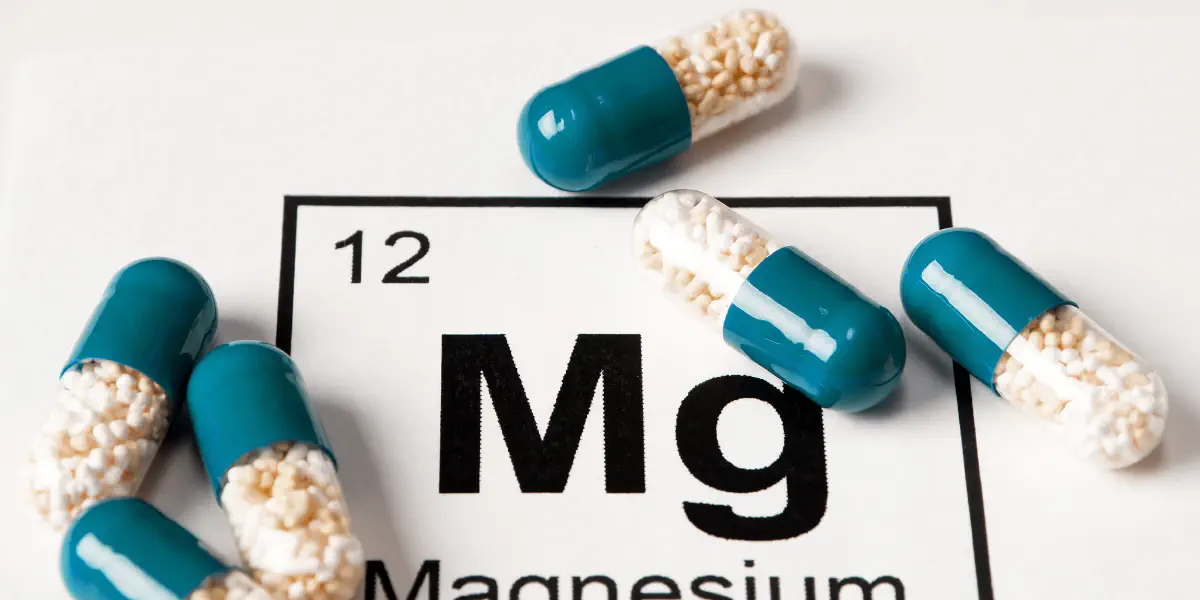Magnesium & Stress: The Missing Link
July 21, 2025

Magnesium: The Overlooked Mineral That Could Transform Stress & Depression Treatment
If you’ve been feeling anxious, irritable, fatigued, or struggling with sleep, there’s a silent force working behind the scenes that might explain it: magnesium deficiency.
And while most people think stress or depression are purely mental health issues, a growing body of scientific evidence reveals that one of the most powerful and overlooked biological levers in regulating mood, sleep, and stress response is magnesium.
🧠 Why Magnesium Matters! More Than You Think..
Magnesium powers over 300 enzymatic reactions in the human body. It’s essential for:
- Nervous system regulation
- Sleep quality
- Muscle and nerve function
- Energy production
- Blood pressure and blood sugar control
Yet despite its critical role, over 60% of adults are magnesium deficient, and the number climbs with age. Why? Because…
- Modern soils are depleted from overfarming
- Processed foods dominate diets
- Popular medications (PPIs, diuretics, antibiotics) deplete it
- Stress, caffeine, and alcohol rapidly burn through magnesium stores
- Aging reduces your gut’s ability to absorb it
By the time a blood test shows you’re low in magnesium, you’re already critically deficient, since less than 1% of your body’s magnesium circulates in your bloodstream.
🔄 The Vicious Cycle: Stress Depletes Magnesium.. and Magnesium Deficiency Fuels Stress
Stress increases your body’s need for magnesium. At the same time, stress burns through magnesium more rapidly, especially under chronic psychological or physiological strain.
Here’s the catch: low magnesium levels make you more sensitive to stress, both mentally and physically.
This sets up a self-perpetuating loop:
- Stress increases
- Body depletes magnesium
- Magnesium demand rises
- Nervous system becomes hyper-reactive
- Stress worsens
If this sounds familiar, you’re not alone.
😓 Symptoms of Magnesium Deficiency (Often Mistaken for “Just Stress”)
Because magnesium regulates the brain, gut, muscles, and hormones, deficiency can look like:
- Fatigue
- Muscle tension or cramps
- Headaches or migraines
- Irritability and nervousness
- Poor digestion or unexplained gut issues
- Brain fog
- Restless leg syndrome
- Trouble falling or staying asleep
- High blood pressure or blood sugar
- Cravings for sugar or chocolate
Many of these symptoms overlap with both chronic stress and mood disorders, especially depression and anxiety.
⚠️ Groundbreaking Research: Magnesium vs. Depression
A pivotal study published in Medical Hypotheses found that magnesium supplementation (particularly glycinate or threonate, which cross the blood-brain barrier effectively) helped patients with severe, treatment-resistant depression improve in less than a week.
Improvements included:
- Enhanced mood
- Reduced anxiety
- Better sleep
- Fewer negative thoughts
Compared to antidepressants, which can take 3–6 weeks to show benefit, magnesium acted rapidly and safely.
🧬 Why Does It Work?
Magnesium:
- Regulates NMDA receptors (critical for learning, memory, and neuroplasticity)
- Prevents excitotoxicity (overactivation of neurons from calcium influx)
- Protects the hippocampus (brain region responsible for emotion regulation)
- Reduces inflammation and oxidative stress in the brain
In simple terms:
“Magnesium acts as a biological modulator, shielding the brain from chemical storms and chronic stress.”
🛠️ Your Magnesium Cheat Sheet
Not all forms of magnesium are equal. Here’s how to pick based on your needs:
| Symptom | Best Magnesium Form |
|---|---|
| Stress, Anxiety, Sleep Issues | Glycinate |
| Cognitive Decline, Brain Fog | L-Threonate |
| Muscle Tension or Pain | Malate |
| Constipation | Citrate |
| Indigestion | Oxide |
| Heart Health, Blood Sugar | Taurate |
For optimal results, pair magnesium with cofactors that enhance absorption and cellular function:
- Vitamin B6 – helps magnesium enter cells
- Vitamin D – balances calcium-magnesium levels
- Boron – boosts magnesium retention
🍫 How to Get More Magnesium in Your Life
✨ Eat Magnesium-Rich Foods:
- Dark leafy greens (spinach, chard, kale)
- Pumpkin seeds & sunflower seeds
- Almonds, cashews, Brazil nuts
- Avocados
- Black beans
- Quinoa
- Salmon
- 70%+ cacao dark chocolate
💊 Consider Supplementation:
- Especially if you have chronic stress, poor gut absorption, take depleting medications, or are over 40
- Start low and go slow; most people tolerate 200–400 mg/day of elemental magnesium
- Choose high-bioavailability forms (glycinate, taurate, or threonate)
🧘 Rebuild Stress Resilience:
- Breathwork, movement, and sunshine help lower cortisol (and preserve magnesium)
- Eat slowly and mindfully; digestion starts in the mouth
- Limit caffeine, sugar, and alcohol when under stress
🩺 Final Advice: What You Can Do Today
- Check your symptoms: are they pointing to stress, or stress + magnesium deficiency?
- Optimize your diet with magnesium-rich whole foods.
- Supplement strategically, using the form that matches your symptoms.
- Support absorption with cofactors and good gut health.
- Speak with your doctor before adding new supplements, especially if you’re on medication or managing chronic illness.
📌 Disclaimer:
This article is for educational purposes only and is not a substitute for professional medical advice. Always consult a healthcare provider, especially before beginning any new supplement regimen.
✍️ Brought to you by Oasis Clinics
Where integrative medicine meets cutting-edge science to help you feel and function better, naturally.